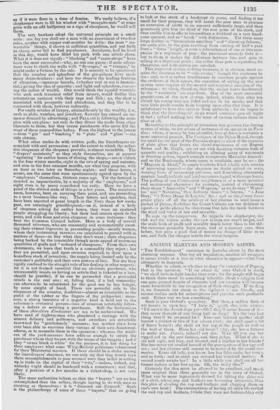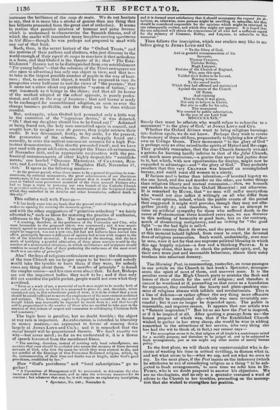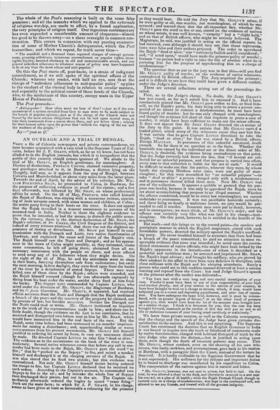ANCIENT MARTYRS AND MODERN SAINTS.
"THE Establishment" continues to flounder about in the most alarming manner. One day all trepidation, another all swagger, it seems totally at a loss in what character to appear—what tone ultimately to maintain. Whether to admit, or whether to deny t lie extension of Popery, that is the question. "If we admit it,- says Oxford to itself, "we shall have to fight harder than ever ; for the people will begin to think there must be something tolerable about a religion that can gain ground despite of clamour, and our enemies will become more formidable by our recognition of their strength. If we deny
it, we diminish our claim to the vigilause our friends, and cannot realize such fat subscriptions and provoke such profitable zeal. Either way we lose something."
Such is poor Oxford's quandary. But then, a sudden flash of wit breaks in upon her. " I have it," quoth she, wide awake ; "I'll outwit the Jesuit dogs yet—Oh! the) 'II never dream of it— they never thought of any thing half so deep ! It's the very last thing they'll be prepared for ! Yes—our beloved mother shall borrow a trinket or two of her odious rival ; she shall sport a bit of finery herself; she shall set her cap at the people as well as the best of them. Bless her old heart ! v•hy, she has a fortune to make yet. Passee, indeed! not she. Wait till you see her rigged out in the new fashion, and then judge. What if she is old and ugly, and lazy, and bloated, and a burden to her friends ? She has never yet availed herself of the prerogatives of her age and sex ; and her charms still remain to be restored by the usual cos- metics. Every old lady, you know, has her false curls, her rouge, and so forth ; and so must our revered but wrinkled mother. A second youth awaits her ! In a little while you shall see all her former suitors at her feet again. Oh, the lucky idea!"
Certainly the idea must be allowed to be excellent, aud much more original than ideas generally are in the town of Oxford. What can be more ingeniously devised for taking the shine out of a rival, whose cap and feathers are becoming attractive, than this plan of stealing the cap and feathers and clapping them on one's own head ? The circumstance of having all one's life reviled the said cap and feathers, (while they were not fashionable,) only
increases the brilliance of the coup de main. We do not hesitate to say, that it is more like a stroke of genius than any thing that has hitherto proceeded from the great seat of orthodoxy. It seems to realize that peculiar mixture of humour and petty larceny which is understood to characterize the Spanish thieves, and of which the reader will remember many laughter-moving specimens in Gil Bias—though he was perhaps not prepared to meet with any out of that book. Such, then, is the secret history of the " Oxford Tracts," and the motives of their authors and abettors, who just discover to the world enough of their esprit de cops to convince it that orthodoxy
is a farce, and that Oxford is the theatre of it ; that " The Esta-
blishment" (herein not to be distinguished from any establishment "For young ladies"—that the columns of the Times newspaper are also open to advertise,) has only one object in view, and that is—. to take in the largest possible number of pupils in the way of busi- ness; that, to secure that object, it would be prepared to vary its prospectus every half-year to suit the views of "the parents;" that it cares not a straw about any particular "system of tuition," ex- cept inasmuch as it brings in the rhino; and that all its horror of the method adopted at Ilse school opposite, is purely profes- sional, and still in the way (f business ; that said horror is ready to be exchanged for unconditional adoption, as soon as ever the change becomes profitable, and the thing can be done without scandal.
But, unhappily, when Oxford had proceeded only a little way in the execution of the "ingenious device," it was detected. " Oh ! that my daughter should live to be found out !" Ashamed at being found out, the holy men assembled again in council, and sought how, by anokher ruse de guerre, they might retrieve their credit. It was de:ermined, firstly, to lay aside, for the present, She prosecution of the scheme, thus unhappily found out ; secondly, to seize the earliest convenient occasion for a high Pro- testant demonstration. This shortly presented itself; and we have Just read with great edification, amongst the Times advertisements of November 26th, and in appropriate conjunction with the pro- fessional announcements of other highly respectable "establish- ments," One headed "OXFORD MEMORIAL of CRANNIER, RID- LEY, and LATYMER," and dated "Magdalen Hall, November 17, 1838: It opens in the following manner- " At the present period, when there seems to be a general disposition to com- memorate, by national monuments, the great achievements of our illustrious countrymen, it haa occurred to several persons that it would be desirable to erect in Oxford some permanent memorial of the three revered Prelates who had so large a share in restoring our own branch of the Catholic Church to primitive ortho,lary, and who, for the maintenance of the Scriptural truths winch they embodied in its Articles and other formularies, suffered death in this city.'
This collatcs well with PROVIDE—
es li has lately come into my head, that the present state of things in England makes an opening for reviving the monastic system ;" and with the other suggestions of" primitive orthodoxy" we lately adverted to,* such as those for restoring the practice of confession, addresses to the Virgin, Sze. The memorial proceeds- " A meeting, therefore, of the gentlemen of the University and City, who were favourable to the proposed object, was summoned ; and it was unani- mously agreed to recommend it to the support of the public. The proposal, as might be supposed, was not a new one, but had not hitherto been carried into effect, principally because a difference of opinion had arisen with respect to the site of the intended memorial. It was resolved at the meeting, that the best mode of testifying a grateful admiration of these pious martyrs would be the erection of a monumental structure, in which architecture and sculpture should combine to record the fact of their preferring the endurance of the most cruel death to a sacrt:fice of principle."
Alas ! the days of religious enthusiasm are gone; the champions of the true Church are no longer eager to be burnt—and nobody would take the trouble to burn them if they were, for nobody cares any thing about them. "A sacrifice of principle" is found the simpler course—and few care even about that. In fact, Bishops are not the important bodies they used to be ; and if they only did not sacrifice the public pocket, people would not care what they sacrificed.
"Even as a work of art, a memorial of such men ought to be worthy both of them and of the city in which it is proposed to place it; and, therefore, when considered only in this subordinate point of view, it is to be wished that a sum should be raised sufficient to secure the employment of the must eminent at chitect and sculptor. This, however, ought to be regarded as secondary to the moral benefit which may reasonably be expected to result from it ; and that benefit will be proportioned to Me number of those who are enabled to take part in the erection of this tribute of respect and veneration to self-denying Christian faith and constancy."
The logic here is peculiar, but no doubt forcible ; the object at any rate is important. An exhortation is intended to liberality in money matters,—an argument in favour of coming down largely at JONES Loam) and Co.'s ; and it is remarked that the moral benejit will be proportioned thereto. We don't exactly see why—but never mind ; as far as we understand it, it is a flower of speech borrowed from the mendicant friars.
"The meeting, therefore, instead of inviting only local subscriptions, are anxious that none should be excluded who revere the memory of those devoted servants of God, who love the cause for which they were content to die, and are mindful of the blessings of that Protestant Reformed religion, which, by thn. instrumentality of their lives and deaths was at length, wader God's good improvidence, established by law." How "God's providence" and "local subscriptions" go to- gether I
" A Committee of Management will bs nominated, to determine the chits Tamer and style of the monument, and to take the necessary measures fur its erection; but whatever that may be, it will require an explanatory iuscription, • Spectator, No. 540; November 3.
The Morning Post, in commenting, yesterday, on some passages in our article on the Church in last week's Spectator, misrepre- sents the spirit of most of them, and answers none. It is the peculiar error of the High Church party to mistake the flesh and bones of their church for the soul of religion ; and therefore it cannot be wondered at if, proceeding on that error as a foundation for argument, they confound the hearty and plain-speaking ene- mies of religious abuses with infidels and revolutionists. This is a line of defence—or rather offence (for any thing more offensive can hardly be complained op—which was once invariably suc- cessful; but it can no longer be depended upon. The public is reasonable, and requires reason. It appears that our article was a "Satanic inspiration !" But let us see how the Post is inspired, or if it be inspired at all. After quoting a passage from us—the honest purport of which was, that if the Established Church wished to gather in her stray sheep, she would be wise in adding somewhat to the attractions of her service, (the very thing she has bad the wit to think of, in fact,) our censor says-
,* The assumption seems to be, that religion of all kinds is a contrivance suited for a worldly purpose, and therefore to be judged of, and to be subjected to fresh arrangements, just as one might any other matter of merely human policy."
In the first place, we will thank any controversialist who is de- sirous of wasting his time in critical cavilling, to discuss what is,
and not what seems to be—what we say, and not what we seem to say. In the next place, if the Post insists on the indecency (which he attributes to us) of considering religion as a thing" to be sub- jected to fresh arrangements." to save time we refer him to Dr. Pussy, who is no doubt prepared to answer his objections. We
are no theologians, and nx rely as a spectator ventured a word of advice to the Church in her troubles, proceeding on the assump- tion that she wished to strengthen her position.
audit is deemed most satisfactory that it should accompany the request for do. nations, as, otherwise, some persons might be unwilling to subscribe, lest they should be considered responsible for the opinions which might be conveyed in One subsequently written, and which they might not approve. It is hoped that the one subjoined will obtain the concurrence of all who feel a sufficient regard for the memory of Cranmer, Ridley, and Latymer, to subscribe to this memorial."
Then follows the inscription, which our readers may like to see before going to JONES LOYD and Co.
" To the Glory of God, And in grateful commemoration of his Servants, Thomas Crarimer, Nicholas Ridley, Hugh Latymer, Prelates of the Church of England, Who, near this spot, Yielded their bodies to be burned, Bearing witness To the sacred truths Which they had affirmed and maintained Against the errors of the Church Of Rome, And rejoicing That to them it was given, Not only to believe in Christ, But also to suffer for his sake, This monument Was erected by public subscription, In the year of our Lord God MDCCCXXXIX."
Surely they must be atheists who would refuse to subscribe to a monument" to the glory of God," at JONES LOYD and Co's.
Whether the Oxford divines want to bring religious burnings into fashion again, we do not know. Perhaps they wish to revive the memory of those old fires, preparatorily to lighting a few of their own on College Green, Their monument "to the glory of God" is perhaps only an altar raised to the spirits of Hatred and Res enge. They probably remember, that the true Church formerly evitced a genius for burning hardly inferior to that of the false Church, and much more precocious,—a genius that never had justice done to it, but which, with new opportunities for display, might now be expanded to advantage—and" the glory of God:' They probably recollect that this very CRANMER was himself an accomplished burner, and could roast old women to a nicety.
If furious zeal is better than toleration,—if besotted bigotry on the one band, and fire and murder on the other, are better things than religious liberty and mutual concession,—then, we beseech our readers to subscribe to the Oxford Memorial : not otherwise. It is remarked by Hume, that" no man will suffer martyrdom who would not also inflict it willingly on all who differ from him,"—an opinion, indeed, which the public events of the period that suggested it might well provoke, though they may not alto- gether justify it ; and therefore, when we see an attempt to raise an artificial sympathy for those who suffered death in the cause of Protestantism three hundred years ago, we can discover in this nothing of humanity or good taste, but on the contrary, much of slumbering malignancy, and an itching for "the good fight "—as the bad fight is called.
Let this country thank its stars, and the press, that it does not at this moment behold lighted, from coast to coast, the detested fires of religious persecution. Such would, undoubtedly, even now be seen, were it not for that one supreme political blessing in which this age happily rejoices—a free and a thinking PEOPLE. It is they, they alone, that keep in check the polemical spirit, and, by their own more just and reasonable behaviour, shame their noisy teachers into reluctant decency. The whole of the Post's reasoning is built on the same false premises ; and all the remarks which we applied to the externals of religious worship, are made to affect, by a forced application, the very principles of religion itself. Our ingenious contemporary has even expended a considerable amount of eloquence—almost too good to be thrown away—on a sheer oversight in common con- struction. This occurs in connexion with our passing enumera- tion of some of Mother Church's delinquencies, which the Post transcribes; and which we repeat, for truth never tires- " The manifold and a thousand times repeated charges of corrupt govern- ment, grasping selfishness, tyrannous encroachment on popular rights, mem, rigible bigotry, besotted obstinacy in old and unmaintainable errors, and one general unbroken adherence to whatever course of policy may have happened to be at any time the most odious and anti. popular."
On this the Post starts off, post-haste, in a strain of indignant astonishment, as if we still spoke of the spiritual affairs of the Church ; whereas any reader, with half an eye, sees that the charge of "unbroken adherence to anti-popular policy" applies to the conduct of the clerical body in relation to secular matters, and especially to the political career of those heads of the Church, who, to the misfortune of this country, occupy seats in the Upper House of Parliament.
The Post proceeds- " Anti-poputar! How often must we hear of that? —just as if the con- ceinments of a system revealed from God to man were to be made subject to the breath of popular opinion—just as if the clergy of the Church were not bound by the most solemn obligations that can be laid upon mortal man, to take their commands from a source above theta, and not below them ; relying for their human safety upon the power that stilleth the raging of the sea and the madness of the people.'
Ay—"j as




























 Previous page
Previous page